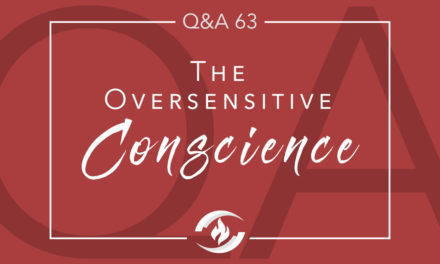Q.
I appreciate your explanation of faith and repentance. I had never considered the idea that faith for salvation and repentance of sin are two sides of the same coin. That raised a question regarding a believer who sins. Is there a two-sided coin of belief and repentance for him? I ask because in dealing with other believers and even dealing with my own sin I have often wondered if simply admitting to God you have sinned is adequate. Should it be accompanied by a sense of remorse or sorrow? I realize that repentance involves a change of mind, but is an admission of guilt truly evidence of a changed mind? I would appreciate your insight.
Rod Shrader
A.
Hello Bro. Rod,
Good follow-up question from a Q&A #14 Faith, Repentance, and Salvation. As faith and repentance are two sides to one theological coin for salvation, the same is true for the believer on various issues of Christian growth. We could use the terminology of faith and surrender, surrender being the essence of the change of mind involved in repentance.
When a believer surrenders to the Spirit’s leadership about a given matter (repentance), he is now depending on the Spirit’s leadership (faith). Or we could word it the other way. When a believer starts depending on the Spirit’s leadership on a given matter (faith), he has just surrendered to the Spirit’s leadership (repentance).
If surrender or repentance is made something different or additional to faith, then you are back to self-effort works. But without faith, it impossible to please God (Heb. 11:6). So surrender or repentance must be understood as the flip-side of faith.
The sense of remorse or sorrow can be misleading. Emotions are responses to what’s happening in the mind. What you focus on in your mind is a voluntary choice. But the emotional responses are involuntary reactions. Also, personalities vary in their emotional make-up. Therefore, you can’t measure repentance based on remorse or sorrow. When the mind understands the truth that the Spirit of God is bringing to bear, and the affections are affected by being convinced of that truth, so that the will surrenders to that truth—there has been a change of mind (repentance).
In dealing with sin, when you surrender to the Spirit’s conviction, you are agreeing with the Spirit about your sin. This admits guilt. But in surrendering to the Spirit, you are implying “I don’t want this, but I need supernatural deliverance.” This constitutes repentance and faith.
John










Omni present and Eternal Separation…how can these coexist? I have a few thoughts on it but am unsure whether they are correct. Hell is eternal separation from God…or is it?
Thanks Jonathan for your question. I’ve wondered about it too. Quite frankly, I do not know the answer 🙂